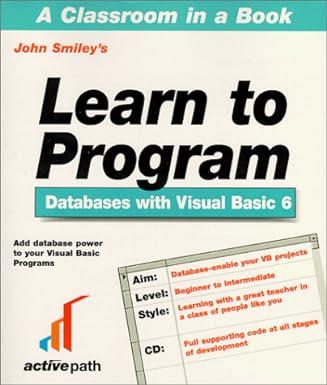Answered step by step
Verified Expert Solution
Question
1 Approved Answer
Problem: First studied by Otto E . R ssler in 1 9 7 6 the R ssler equations comprise three coupled ordinary differential equations: (
Problem: First studied by Otto E Rssler in the Rssler equations comprise three coupled
ordinary differential equations:
cxzb
td
zd
ayx
td
yd
zy
td
xd
Specifically Rssler studied these equations with parameter values: a b and c
Using either fourth order RungeKutta or step AdamsBashforthMoulton with fourth order
RungeKutta starter develop a MATLAB function Mfile or Python file to solve the Rssler
equations with these parameter values over the time frame t sec for arbitrary initial
conditions. Using this code solve the equations for initial conditions: x y
z
You may visualise the solution by simply plotting yt vs xt for example, but it is much better to
use the plot command to give a D plot of xtytzt parameterised by t With some suitable
rotation you should see a shape which is called the Rssler attractor.
A feature of the Rssler equations for these parameter values is sensitive dependence on initial
conditions. Solve the equations again but this time with the initial conditions: x y
z which are rather close to those considered previously. Compare the resulting
solutions by for example, plotting the partial solutions xt for the first and second sets of initial
conditions on the same axes. You should observe that, although the two solutions start out very
close and although at many times they will again be very close, at various times they have moved
apart rather significant
Step by Step Solution
There are 3 Steps involved in it
Step: 1

Get Instant Access to Expert-Tailored Solutions
See step-by-step solutions with expert insights and AI powered tools for academic success
Step: 2

Step: 3

Ace Your Homework with AI
Get the answers you need in no time with our AI-driven, step-by-step assistance
Get Started


